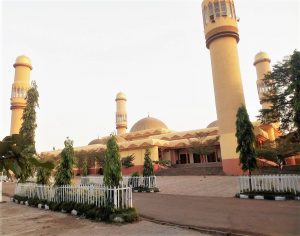Source: www.morningstarnews.org
Date: March 27, 2023
Fulani herdsmen and others attack two villages.
By Our Nigeria Correspondent

Sultan Bello Mosque in the city of Kaduna, Kaduna state, Nigeria. (Anasskoko, Creative Commons)
ABUJA, Nigeria (Morning Star News) – Fulani herdsmen and other terrorists killed 27 Christians in two attacks this month in Kaduna state, Nigeria, local sources said.
Both attacks took place in Zangon Kataf County, where 10 Christians were killed on March 14 in Langson village and 17 slain in Ungwan Wakili village on March 10, residents said.
Residents of Langson said dozens more were wounded in the attack that began at 9 p.m.
“I urge the government to match words with action by arresting the perpetrators since the government knows them and where they are,” said Sam Achie, president of the area community development association. “I appeal to Nigeria government to as a matter of urgency deploy more security agents to Zangon Kataf Local Government Area in order to arrest the recurring attacks on innocent Christians whose lives and property are being destroyed for no justifiable reason.”
In Ungwan Wakili, residents said Muslim terrorists attacked the village and nearby Christian communities at about 9 p.m. for about 40 minutes before retreating.
“My family house in the village was attacked by the terrorists and armed herdsmen,” resident Joshua Solomon told Morning Star News in a text message. “The house was burned down, and no one is left alive. They killed all my family members.”
Solomon identified 16 of those killed as Daniel Soji, Emmanuei Ibrahim, Jummai Gajere, Aaron Thomas, Rahila Sunday Ishaya, Blessing Zakaria, Felicia Zakaria, Gloria Zakaria, Gaji Tonak, Elizabeth Tokan, Peace Tokan, Favour Patrick, Peace Patrick, Chinwe Patrick, Ruth John and Emmanuel John.
He also identified six Christians receiving hospital treatment for wounds received in the attack as Precious Timothy, Sunday Ishaya, Jessica Zakaria, Chison Ikechukwu, Patience Matthew and Jessica Tokan.
Area resident Barnabas Tonak said his mother and an in-law with her two children were among those killed.
“Our attackers were Muslim Fulani herdsmen who came along with terrorists to invade our community,” Tonak said in a text message to Morning Star News. “In all, 17 Christians were killed during the attack. Five members of my family were among those killed, and another family member was injured. Aside from the killing of our people, these herdsmen have in the past deliberately destroyed our farms and crops.”
Christians from southern Kaduna who have fled to Europe condemned the attacks.
“We are concerned with the recent killings in Ungwan Wakili and other villages that resulted in the loss of over 17 lives, with innocent citizens injured,” Casimir Biriyok and Janet Nale, president and secretary respectively of the Southern Kaduna People in Diaspora (SOKAPDA), Europe, said in a statement. “These attacks are coming barely three months after the mass murder of 38 harmless Christian villagers in Malagum, Kamuru-Ikulu and Abun (Broni Prono) communities in southern Kaduna on Dec. 18, 2022.”
They said that they have heard no statement from authorities on the attacks, much less visits by officials to the survivors.
“The governments of Nigeria and that of Kaduna state have shown little support to either the victims or issued a simple statement of condemnation of the killings,” they said.
Christians from southern Kaduna living in Europe find it difficult to comprehend how human lives seem to have little or no value in Nigeria in general and in Kaduna state, they said.
“It is essential to hold those who have sworn to protect us to do the needful, for we in diaspora are frustrated that in the 21st century, technology like phone tracking, geo orbits satellite, drones and old-fashion spying, etc., have not been fully utilized,” Biriyok and Nale said. “The peaceful Kaduna state that we once knew is no more, and we sincerely hope that somewhere within the political class, someone will take security of lives seriously, for it is absolutely too tragic that our state has become a killing field.”
Muhammad Jalije, spokesman for the Kaduna State Police Command, said in a statement only that, “I can confirm that there was an attack, and people were killed.”
Nigeria led the world in Christians killed for their faith in 2022, with 5,014, according to Open Doors’ 2023 World Watch List (WWL) report. It also led the world in Christians abducted (4,726), sexually assaulted or harassed, forcibly married or physically or mentally abused, and it had the most homes and businesses attacked for faith-based reasons. As in the previous year, Nigeria had the second most church attacks and internally displaced people.
In the 2023 World Watch List of the countries where it is most difficult to be a Christian, Nigeria jumped to sixth place, its highest ranking ever, from No. 7 the previous year.
“Militants from the Fulani, Boko Haram, Islamic State West Africa Province (ISWAP) and others conduct raids on Christian communities, killing, maiming, raping and kidnapping for ransom or sexual slavery,” the WWL report noted. “This year has also seen this violence spill over into the Christian-majority south of the nation… Nigeria’s government continues to deny this is religious persecution, so violations of Christians’ rights are carried out with impunity.”
Numbering in the millions across Nigeria and the Sahel, predominantly Muslim Fulani comprise hundreds of clans of many different lineages who do not hold extremist views, but some Fulani do adhere to radical Islamist ideology, the United Kingdom’s All-Party Parliamentary Group for International Freedom or Belief (APPG) noted in a recent report.
“They adopt a comparable strategy to Boko Haram and ISWAP and demonstrate a clear intent to target Christians and potent symbols of Christian identity,” the APPG report states.
Christian leaders in Nigeria have said they believe herdsmen attacks on Christian communities in Nigeria’s Middle Belt are inspired by their desire to forcefully take over Christians’ lands and impose Islam as desertification has made it difficult for them to sustain their herds.
